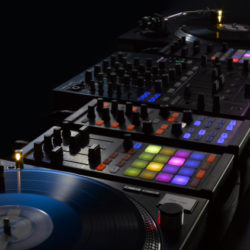DJing is a performance art, and when you are on stage, you will want to do anything you can to engage the crowd and seem as interesting as you can while performing your set. Over the years, many digital DJs have faced harsh criticism from patrons because of their laptops. We have all seen a DJ using their laptop and may have wondered, “What are they doing up there, checking their Facebook?” It seems that many DJs who use laptops are only engaging their screen, while they should be engaging their audience.
Years ago, developers of DJ software saw this disconnect and decided to try and make a piece of gear which functioned as an extension of the software they were using. By using the already existing language of MIDI (Musical Instrument Digital Interface,) hardware developers started making controllers that allowed DJs to perform with minimal use of their laptops, thus creating a more engaging approach to DJing. The use of a MIDI controller in a performance helps DJs keep their eyes on the audience and off of their laptop.
With the rise of digital DJing, the MIDI controller market has expanded significantly over the last few years. There are many choices out there for DJs and it can be a bit confusing as to which controller is the right one for you. There are different types of controllers based on the different workflows and there is no right or wrong direction to go. Over the next couple days I’m going to break down some of your options and try to help you figure out what the right MIDI controller is for you.
All-In-One DJ MIDI Controllers
An all-in-one MIDI controller is a controller which has all the functions of the software you’re using, found on one controller. This means that if the controller was developed correctly, the user shouldn’t need to touch their laptop at all when using it. In addition to this, one key feature of all-in-one controllers is the use of an onboard soundcard. The inclusion of a soundcard really simplifies the setup process by providing a simple RCA output to the sound system. This cuts down on setup time, cabling and confusion.
All-in-one MIDI controllers made their way onto the scene a few years ago with the Traktor S4. While the S4 wasn’t the first all-in-one controller, it was the first to be adopted by DJs on a large scale. Soon after the S4 was released, the awkward-shaped DJ boxes were seen in clubs everywhere. Knowing the good reputation of Native Instruments, many DJs bought in on the all-in-one version of MIDI controllers. About a year after its release, I started to see the S4 in clubs less and less, and now I rarely see them used at all.
Where Does the All-In-One Fit In?
The all-in-one DJ setup took some very hard criticism from professional DJs around the world. Many felt they were too big for a standard DJ booth, while others found the output and sound quality did not stack up to their standard DJ mixer. Many DJs started moving back to the setup they had prior to using a MIDI controller. This isn’t to say that these controllers aren’t good products, but rather they didn’t fit in the workflow of many DJs.
The all-in-one controller has a definite place in DJing, but maybe not in a DJ booth or professional setup. The all-in-one controller has found a home with many DJs who are mobile and would prefer not to carry a large amount of gear around with them to set up. Wedding DJs will use these controllers to their advantage and really cut down setup time along with simplifying the amount of gear they need to haul into the venue.
What To Look For
There are many all-in-one controllers to choose from, and most perform the same function. When making a choice, first look to see what controllers are supported by the software you are using to DJ. After looking into compatibility, then look at your workflow. Ask yourself, “Does this controller have a button, knob or fader for everything I use in my workflow?”
Here are a few all-in-one controllers I would recommend taking a look at when trying to decide what is best for you. The Native Instruments Traktor S4, Berhinger CMD Studio 4A, Pioneer DJ-TT1, Numark NS7II & Hercules 4-MX.
Check back for Part 2 tomorrow.






Join the discussion
comments powered by Disqus